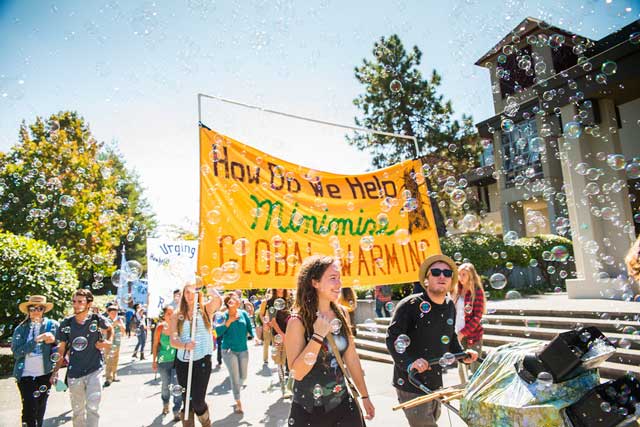
Led by Wildlife Professor Jeff Black, Facilities Management Climate Action Analyst Morgan King, and Film Professor Ann Alter, the effort is supported by a $25,000 grant from the California State University’s Campus as a Living Lab (CALL).
The program stems from the CSU Sustainability Plan’s goal of integrating sustainability into the academic curriculum. CALL brings together faculty and facilities management staff to explore and apply sustainability concepts and theories. It also provides students opportunities to solve real-world issues and helps create a more sustainable campus community.
So far, more than 50 CALL projects have been developed across the CSU. Among those projects is a study by CSU Northridge civil engineering students, who examined the efficiency of campus buildings.
“This grant is an exciting opportunity to move beyond simple awareness of how we use resources. Students have a chance to gain the skills and knowledge they need to be agents of resiliency in their communities, while continuing to be active participants in HSU’s conservation, waste reduction, and resiliency efforts,” says King.
Those efforts include many student-run activities such as the live-in eco-demonstration house known as Campus Center for Appropriate Technologies. University initiatives include the HSU Climate Action Plan (a document designed to guide the University’s efforts to curb greenhouse gas emissions) and the goal to reduce emissions to or below 1990 levels by 2020.
For its commitment to sustainability, HSU was rated a top performer in the 2017 Sustainable Campus Index.
HSU’s project kicks off in May with a workshop. Students, faculty, and staff will develop guidelines for incorporating climate change, resiliency, and sustainability classes into the curriculum. With climate change inextricably linked with human rights, the guidelines will address environmental and social justice concerns. A set of potential student learning outcomes (the knowledge, skills, abilities, or attitudes students will gain) will also be prepared. The group’s recommendations will then be shared with faculty and the Academic Senate’s curriculum committee for consideration.
In the meantime, Alter’s film students will produce a social change film about ways students can individually and collectively embrace sustainable life practices. The film will be shown at orientation for new students, screened and discussed in the classroom, and distributed throughout campus.
Alter hopes the film does more than educate.
“Social change filmmaking is about motivating the audience to change their behavior,” she says. “In the case of our film, it’s critical to inspire other students to engage in learning what they can do to make a difference for our community and for our planet.”